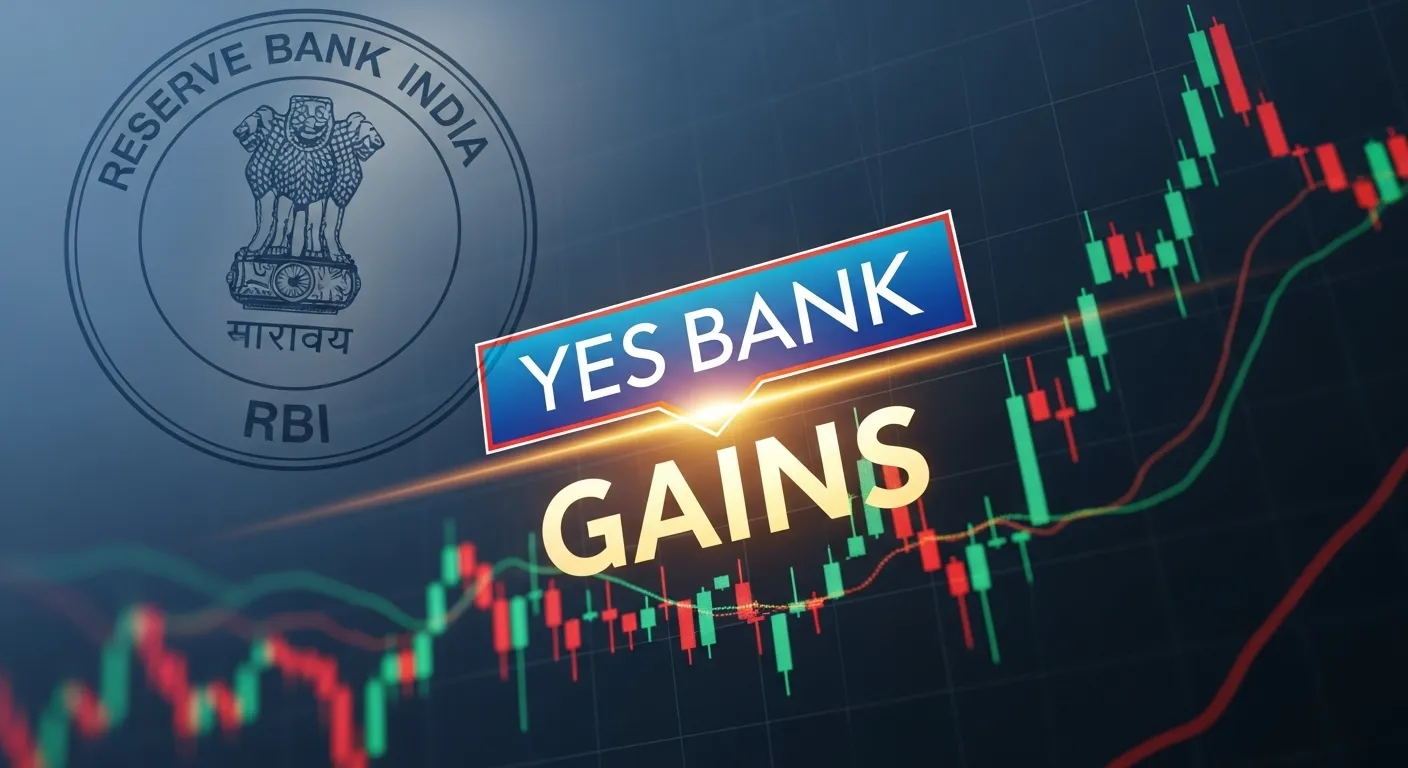Related Articles
Ask anything about stocks
Yes Bank Gains as RBI Approves Proposed Board Restructuring
Table of Contents
Key Takeaways
- RBI approval boosts Yes Bank’s governance.
- Stock gains show investor confidence.
- SMBC adds global expertise and support.
- NPAs and profit growth remain challenges.
Yes Bank shares gained after the Reserve Bank of India (RBI) approved its proposed board restructuring. This news lifted market sentiment and gave investors new hope. The approval shows how regulators are pushing for stronger governance in private banks.
We know Yes Bank has faced rough times in the past. A few years ago, the bank struggled with rising bad loans and leadership issues. It needed a rescue plan led by the RBI and the State Bank of India. Since then, the focus has been on fixing its balance sheet. This improves transparency and wins back trust.
The new board approval is a step in that journey. A stronger board means better checks and controls. It also means the bank can make quicker decisions with more confidence. Investors see this as a sign of long-term recovery.
We must note, though, that governance changes are not enough on their own. Yes Bank still has to grow its lending business, reduce risks, and face tough competition in the private banking space. But with RBI’s nod and a new leadership structure, the path ahead looks clearer and more stable.
Background on Yes Bank
Yes Bank faced a near-collapse in 2019. The bank had fast loan growth and rising bad debts. That led to loss of investor trust and tight liquidity. The RBI stepped in and arranged a rescue plan. State Bank of India and several other lenders invested to stabilise the bank. Since then, the bank has focused on cleaning its books and fixing governance. Leadership changes, capital infusions, and stricter oversight helped slow the slide. Yet the road to full recovery remained long. Past crises left deep scars on funding and client confidence. Analysts say governance reform is as important as financial repair for long-term stability.
Details of RBI Approval
The Reserve Bank of India issued formal approval for amendments to Yes Bank’s Articles of Association on September 9, 2025. The approval allows the nomination of two directors by Sumitomo Mitsui Banking Corporation (SMBC). It also allows nomination of one director by the State Bank of India (SBI).
The change aims to formalise strategic investor representation on the board. RBI’s letter sets the legal basis for the new board composition to take effect after the share transfers are completed. Regulators stressed that SMBC’s entry will not make it a promoter, which limits promoter-style control and keeps supervisory rules tighter.
New Board Structure and Key Appointments
The amended rules allow SMBC and SBI to place nominee directors. These nominees bring global banking experience and large bank governance practices. The reappointed part-time chairman, R. Gandhi, adds central banking experience and a strong background in regulation.
The fresh mix of independent directors and nominees aims to improve oversight. The presence of an international partner like SMBC may also bring new risk-management techniques and access to global markets. Still, nominee directors must balance their sponsor’s interests and the bank’s independent duty to depositors.
Market and Investor Reaction
Yes Bank shares rose after the announcement. The stock climbed as much as 2-3% on the day of the news and continued to trade higher in short bursts. Investors reacted positively to clearer governance and the prospect of strong backing from a global bank. Market commentary noted that regulatory approvals reduce a key risk factor for future investors. Some traders, however, took profits after the initial spike. Overall, the approval helped calm short-term nerves and improved the bank’s market tone.
Strategic Implications for Yes Bank
Board restructuring and SMBC’s stake will likely shift strategy. The bank can now lean on external expertise for areas such as corporate lending standards and treasury operations. New board oversight may speed up policy fixes on credit risk and compliance. Access to a strong foreign partner could also ease funding pressures and open new client relationships.
Governance changes also improve the bank’s pitch to institutional investors. However, strategy shifts will only work if execution follows. Improved governance must lead to better lending discipline and clearer capital planning.
Challenges Ahead Despite Restructuring
Yes Bank still faces major challenges. Non-performing assets and credit costs remain central issues. Profit growth has been uneven and depends on higher, cleaner lending. Rebuilding retail and corporate client trust will take time. Competition in India’s private banking sector is fierce, with many players chasing the same corporates and high-value customers. Integration of new directors’ views into day-to-day decisions can also take months. Until the bank shows consistent earnings and lower credit stress, investor caution will remain.
Expert Opinions & Analyst Views
Analysts say the RBI nod is a crucial regulatory milestone. Some note that SMBC’s entry is a vote of confidence from a global lender. Experts highlight that stronger governance reduces regulatory risk and can improve capital flows. Yet many also warn that governance fixes do not automatically cure asset quality problems. Turnaround requires disciplined lending, tight cost control, and sustained capital buffers. Several market commentators call the move “necessary but not sufficient” for a full recovery.
Broader Impact on India’s Banking Sector
The RBI’s approval sends a clear signal about foreign investment and governance norms in Indian private banks. It shows regulators are willing to permit strategic foreign partnerships while keeping promoter status rules strict. Other banks may view international tie-ups as a route to strengthen balance sheets and governance. The episode also underscores RBI’s active role in board-level oversight. For the market, the development could lift confidence in banks that present cleaner governance plans backed by credible investors.
Bottom Line
RBI’s approval for the board changes is an important step for Yes Bank. The move brings stronger oversight and a global partner on board. Markets welcomed the clarity. The bank still must fix asset quality and grow profits. Long-term recovery will depend on steady execution and clearer financial results. For now, the restructuring offers a better chance at a durable turnaround.
Frequently Asked Questions (FAQs)
Why did RBI approve Yes Bank’s board restructuring?
RBI approved Yes Bank’s board restructuring on September 9, 2025. This initiative was taken to improve governance, add stronger oversight, and allow directors from SBI and SMBC for stability and growth.
How did Yes Bank’s share price react to the RBI’s approval?
Yes Bank’s share price rose about 2-3% after the RBI’s approval on September 9, 2025. The gain reflected improved investor trust and a positive market environment.
Disclaimer:
The above information is based on current market data, which is subject to change, and does not constitute financial advice. Always do your research.



